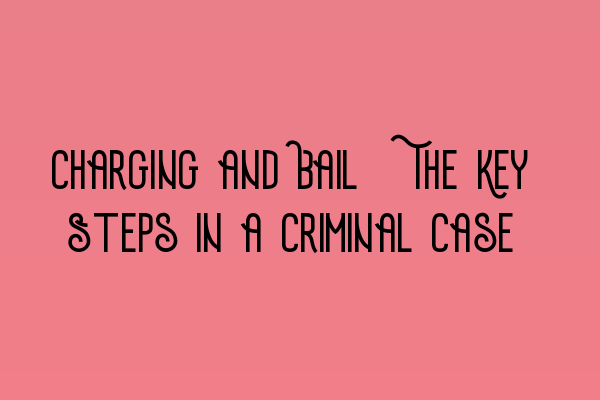Charging and Bail: The Key Steps in a Criminal Case
Introduction:
In the criminal justice system, the process of charging and bail plays a crucial role. From the moment an individual is suspected of committing a crime to their appearance in court, these key steps determine how the case progresses. This blog post will delve into the intricacies of charging and bail, shedding light on their significance in a criminal case.
Understanding Charging:
The first step in any criminal case is the charging process. This is where a formal accusation is made against an individual, stating that they have committed a specific crime. The charging process involves the gathering of evidence, statements from witnesses, and the examination of any physical or digital evidence that may be associated with the crime.
Once the evidence has been collected and reviewed, the prosecuting authority, such as the Crown Prosecution Service (CPS) in England and Wales, will decide whether there is enough evidence to proceed with the case. If deemed necessary, they will then issue a charge, which outlines the alleged criminal offenses committed by the accused.
Bail: A Crucial Consideration:
After the charging process, the question of whether the accused should be granted bail arises. Bail refers to the temporary release of an individual charged with a crime, pending their trial or court appearance. If bail is granted, the accused will be allowed to remain in the community until their case reaches its conclusion.
The decision to grant bail is not taken lightly and involves various factors, such as the nature of the offense, the potential risk posed by the accused, and the likelihood of them absconding. Bail conditions may also be imposed to ensure the safety of the community and the proper administration of justice.
Types of Bail:
There are different types of bail that can be granted, depending on the circumstances of the case. These include:
1. Police Bail: This is where the police release the accused person prior to their appearance in court. Police bail may have conditions attached, such as reporting regularly to a police station or adhering to a curfew.
2. Court Bail: If the accused is not granted police bail, they will be brought before the court for a bail hearing. During this hearing, the court will consider the facts and decide whether to grant bail. The court may impose additional conditions or remand the accused in custody if there are concerns regarding flight risk or public safety.
3. Conditional Bail: Sometimes, the court may grant bail with specific conditions, such as surrendering a passport, refraining from contacting certain individuals involved in the case, or attending regular check-ins with probation services. Failure to comply with these conditions may result in the revocation of bail.
4. Remand: In cases where bail is not granted or deemed appropriate, the accused will be remanded in custody until their trial or court appearance. Remand can occur if the court considers the accused to be a flight risk, a danger to the public, or if there is a likelihood of interference with witnesses or evidence.
Conclusion:
Charging and bail are vital components of the criminal justice system. The charging process initiates a criminal case, while the decision to grant bail determines whether the accused will be released prior to their trial or court appearance. Understanding the key steps in a criminal case helps individuals involved in the legal process navigate through a complex system.
To learn more about the preparation for the SQE exams and enhance your knowledge in criminal law and practice, check out our related articles and resources below:
– [SQE 1 Practice Exam Questions](https://fqps.co.uk/sqe/sqe1-preparation/mcq-practice-quiz)
– [SQE 1 Practice Mocks FLK1 FLK2](https://fqps.co.uk/sqe/sqe1-preparation/practice-mocks-quiz)
– [SQE 2 Preparation Courses](https://fqps.co.uk/sqe/sqe2-preparation)
– [SQE 1 Preparation Courses](https://fqps.co.uk/sqe/sqe1-preparation)
– [SRA SQE Exam Dates](https://fqps.co.uk/sqe/sqe1-sqe2-exam-dates)
Stay tuned for more informative articles on criminal law and practice.
